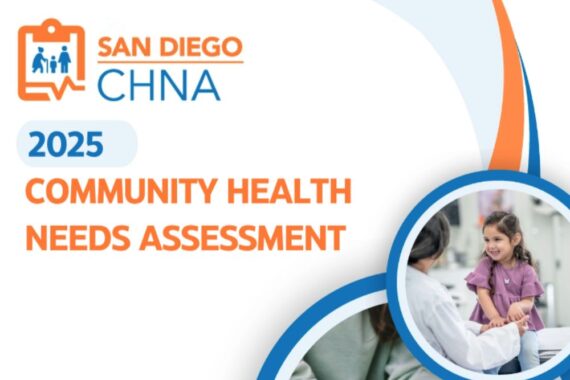Understanding Healthcare Part 3: Mental health emergencies and clinics
September 29, 2023 Community, Public Health
Mental illness does not discriminate. It can affect anyone regardless of age, race, sexual orientation, income, etc. Just as you might check in with a doctor regarding your physical health, it’s important to check in with yourself and others concerning your emotional well-being too.
In Part 3 of this series, Understanding Healthcare, we’re focusing on mental health terminology and facilities, who to contact in a mental health crisis, and a list of local resources for people living in East San Diego County.
Mental Health
Mental health includes our emotional, psychological, and social well-being. It affects how we think, feel, and act as we cope with life. It also helps determine how we handle stress, relate to others, and make choices. Mental health is important at every stage of life, from childhood and adolescence through adulthood and aging.
Behavioral Health
Behavioral health is a broad term that refers to the wide variety of behaviors that impact a person’s physical and mental health. Behavioral health services include psychiatric care, medication, counseling, and substance use disorder treatment.
Mental Illness
Mental illnesses are conditions that affect a person’s thinking, feeling, or mood. They can be diagnosed and treated, often with medications and other therapies. One in 6 adults in the U.S. lives with a mental illness. Common examples include anxiety, depression, eating disorders, post-traumatic stress disorder (PTSD), and schizophrenia. Some mental illnesses can be related to and/or mimic medical conditions. For instance, schizophrenic symptoms like hallucinations and paranoia may be related to a medical diagnosis of dementia. Therefore, a full health evaluation, including a physical exam, is needed. This may include blood work and/or neurological tests.
Mental Health Clinics
Mental health clinics, sometimes also known as behavioral health clinics, are outpatient facilities that specialize in the diagnosis and treatment of psychological and behavioral health problems. They can provide routine services or assist in an emergency.
READ Part 2: Clinics
Mental Health Emergencies
What is considered a mental health emergency?
If you or someone else you know is thinking about hurting themselves or others or serious property damage is occurring, it’s considered a mental health emergency. Whether the person in crisis has a known diagnosis of mental illness or not, in a mental health emergency, intervention is usually needed to de-escalate the situation.
Who should I call during a mental health emergency?
- You should call 911 and tell the dispatcher explicitly what is happening so that medical staff can be prepared if needed. Clearly state if someone has a known mental health history, and/or diagnosis.
- Dial the 988 National Suicide & Crisis Lifeline, where you’ll be connected to a crisis counselor
- Or directly contact behavioral health intervention teams like San Diego’s MCRT (Mobile Crisis Response Team) at 888.724.7240. When MCRT is alerted, they’ll assess the severity of the situation. If the person requires intensive supervision and the medical necessity of a hospital setting, they may be transferred to a Crisis Stabilization Unit (CSU).
Mental Health Hospital Services – East County (Adults):
Mental Health Clinics – East County:
Phone Lifelines & Hotlines (Support for Emergencies):
- Center for Community Solutions 24/7 Crisis Hotline (888.385.4657)
- 24-hour toll-free County-wide crisis line for crisis intervention, information, and referrals related to domestic violence, sexual assault, and stalking in San Diego.
- Child Abuse or Neglect Hotline (858.560.2191 San Diego, or 800.344.6000 (California), or 800.422.4453 (National)
- Call if you are concerned about a child’s safety, are a parent afraid you may harm your child, or are a child or youth who believes you are being abused or neglected.
- Narcotics Anonymous Hotline (619.584.1007 San Diego, or 619.546.0774 Español, or 800.479.0062 National toll-free)
- Reach out to this organization if you are dependent on substances. Visit: www.sandiegona.org for the latest meeting information.
- National Sexual Assault Hotline (800.656.4673)
- Call to reach the free & confidential 24/7 hotline or chat online.
- National Domestic Violence Hotline (800) 799-7233
- Call to reach a trained staff member from a sexual assault service provider in your area for free & confidential 24/7 help or chat online.
- National Human Trafficking Hotline (888) 373-7888
- Anti-Trafficking Hotline Advocates are available 24/7 to take reports of potential human trafficking or chat online.
- Strong Hearts Native Helpline (844) 762-8483, then press 7NATIVE)
- Domestic violence and dating violence helpline that offers culturally appropriate support and advocacy for American Indians and Alaska Natives.
- The Trevor Project – (866) 488-7386, or text TREVOR to 1.202.304.1200)
- Offers crisis services that create a safe, accepting, and inclusive environment for youth who identify as Lesbian, Gay, Bisexual, Transgender, Queer and/or Questioning (LGBTQ).
- Veterans Crisis Line – Dial 988, then press 1
Phone Warmlines:
What is a warmline? A warm line aims to be a highly accessible, low-threshold, mental health resource that people can use to seek support before they’ve reached the crisis point. The hope is to provide support now to prevent a crisis later. All counselors are peers with their own level of lived life experiences and speak from a place of empathy, understanding, and hope for recovery.
- The California Peer-Run Warm Line: (855.600.9276)
- Free non-emergency emotional support is available to anyone in the state 24 hours a day, 7 days a week.
- San Diego Warm Line: (619) 295-1055)
- Open for San Diego residents only from 3:30-11:00 PM, 7 days a week.
- Project Return Peer Support Network: (888) 448-9777
- Trans Lifeline – (877) 565-8860
- Trans Lifeline’s Hotline is a peer support phone service run by trans people for our trans and questioning peers. Call us if you need someone trans to talk to, even if you’re not in a crisis or if you’re not sure you’re trans.
Other Mental Health Resources & Support – East San Diego County
SAMHSA’s Behavioral Health Services Search Tool:
Adults/Older Adults:
- Center for Community Solutions (858.272.5777)
- Services focused on ending relationship and sexual violence with a 24/7 phone support line available.
- Crisis House
- Services for women, men, and children who have survived domestic violence, along with outreach and housing for those experiencing homelessness
- MHS/TURN – Action East (10201 Mission Gorge Suite O Santee, CA 92071)
- Dual track treatment program for individuals with severe mental illness and/or a chronic substance use disorder.
- McAlister Institute – East County Regional Recovery Center (1365 N. Johnson Ave. Suite 111 El Cajon, CA 92020)
- Program treatment for alcoholism and drug addiction.
- Heartland House (5855 Streamview Dr, San Diego, CA 92105)
- Men’s residential program
- SD County Strength-Based Case Management (619.401.5424)
- Case manager assigned to assist with long-term behavioral health problems to maintain housing, obtain financial assistance, and obtain medical and psychiatric treatment, ages 18-59 and other criteria must apply
- Saddles in Service (6476 Japatul Highlands Rd, Alpine, CA 91901)
- Serving mental health needs of Veterans, Active Duty Military, and First Responders
- San Diego Freedom Ranch (1777 Buckman Springs Rd Campo, CA 91906)
- Men’s residential program
- Survivors of Torture (619.278.2400)
- Provides specialized care at the healing center to help survivors heal and become self-sufficient and healthy members of their families and communities.
Youth/Women/Families:
- Center for Positive Changes (CFPC) (4950 Waring Rd. Suite 4 San Diego, CA 92120)
- Support for youth between the ages of 12-18 who are dealing with mental health conditions or family conflicts.
- Fred Finch Dual Diagnosis Residential Program (619.797.1090)
- Specialized educational placement for men and women, ages 12-22 who have a developmental disability and may also have a DSM-V mental health diagnosis.
- Family Health Centers – Mental Health Services (Multiple locations)
- Provides supportive services to everyone, with a special commitment to uninsured, low-income and medically underserved persons
- Home Start (5005 Texas Street Suite 203 San Diego, CA 92108)
- Addressing conditions that can contribute to risky or abusive situations – poverty, unsafe neighborhoods, lack of affordable housing, and unemployment – while concurrently addressing individual self-sufficiency and emotional needs.
- License to Freedom (619.401.2800)
- Mental health services for immigrants and refugees
- McAlister Institute – East Teen Recovery Center (550 Fesler Street, Suite G1 El Cajon, CA 92020)
- Substance abuse treatment, recovery, and education
- McAlister Institute – Kiva Learning Center for Women & Children (2049 Skyline Dr, Lemon Grove, CA 91945)
- Residential treatment program for women, with and without children, who are seeking help for alcohol and other drug addiction.
- One Safe Place – North County Family Justice Center (1050 Los Vallecitos Boulevard, San Marcos, CA 92069)
- Services all under one roof to anyone who has experienced child abuse, sexual assault, domestic violence, hate crime, elder abuse, human trafficking, violent loss, family violence, or other abuse or victimization.
- Rady Children’s – Outpatient Psychiatry Clinic & School-Based Services (3665 Kearny Villa Road, Suite 101, San Diego, CA 92123)
- Serving Grossmont Union HS District students
- San Diego Center for Children – East County Outpatient Program (3002 Armstrong St. San Diego, CA 92111)
- Partners with East County school districts to provide outpatient mental health services for children and families who are Medi-Cal beneficiaries or uninsured.
- San Diego Youth Services – East County Behavioral Health Clinic (1870 Cordell Court, Suite 101, El Cajon, CA 92020)
- Provides trauma-informed, outpatient mental health services, and case management to youth (4-21 years old) and their families who are low-income or uninsured, full-scope Medi-Cal beneficiaries, or eligible for services through the Mental Health Service Act.
- San Ysidro Health – Chaldean & Middle Eastern Support Services (875 El Cajon Blvd. El Cajon, CA 92020)
- Serves Middle Eastern refugees or immigrant children, adolescents, adults, and older adults with serious emotional disturbance (SED) and/or serious mental illness (SMI), who are full-scope Medi-Cal beneficiaries, low-income, or uninsured.
- Vista Hill – Don Allen ParentCare Family Recovery Center (4990 Williams Avenue, La Mesa, CA 91942)
- Supports chemically dependent women and their families who are at high risk for child abuse, domestic violence, and homelessness.
- Vista Hill – MERIT Academy (619.956.0615)
- Serving Grossmont Union HS District special education students
- Voices for Children (858.569.2019)
- Court Appointed Special Advocates volunteers support foster care children and/or sibling groups
- Your Safe Place – Family Justice Center (1122 Broadway Unit 200, San Diego, CA 92101)
- Confidential, comprehensive services to anyone who has experienced domestic violence, family violence, elder abuse, sexual assault, or sex trafficking.
READ NEXT | Part 4: Substance Use Disorders & Overdose
Any questions or comments? Contact us here.




